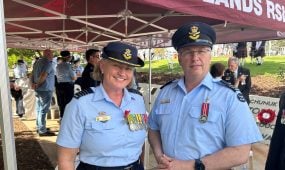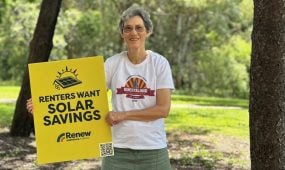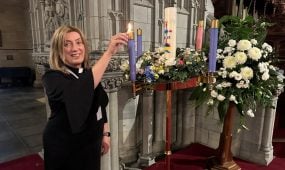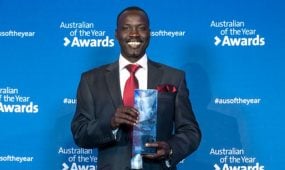Q&A with multi-lingual Saibai elder, customary law expert, social justice icon and NATSIAC executive member, Aunty Dr Rose Elu
Spotlight Q&A
Meet Aunty Dr Rose Elu and find out why a US President gave her a bear hug, what class action she is involved in, what day she would like to re-live, why she is going to Azerbaijan in November, her thoughts on Reconciliation, her earliest child memory and her secret skill
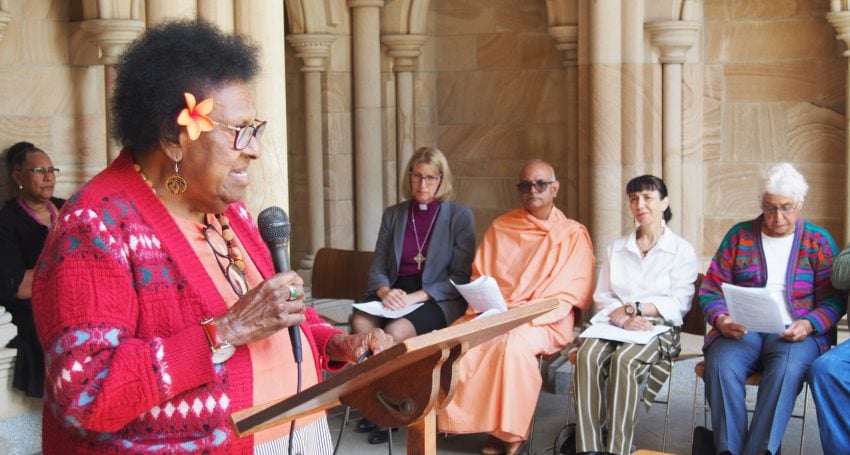
Where do you currently live and where do you worship?
I live in Brisbane, and I worship at Holy Trinity, Fortitude Valley. I am there every Sunday unless I am away. On the third Sunday of the month there is a special service with some parts said in Language.
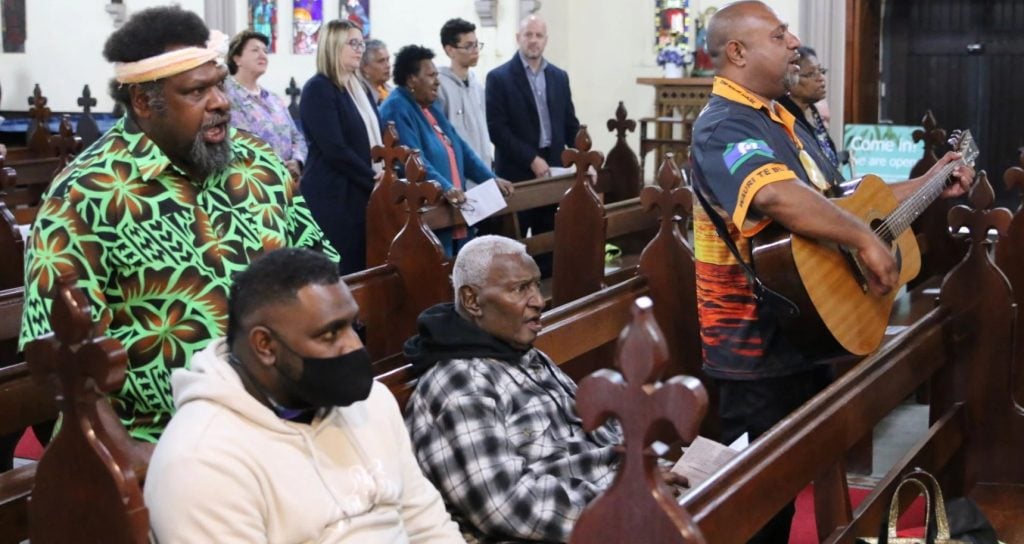
Torres Strait Islander parishioners based at Holy Trinity, Fortitude Valley welcomed people across our Diocese and the wider community to celebrate the 30th anniversary of the landmark High Court Mabo case on 3 June 2022. The service included a reflection about Mabo and the importance of the constitutionally enshrined Voice by Aunty Dr Rose Elu (back, centre). The singing was led by Uncle Rupert (seated, centre), whose great-great-great grandfather received the Bible in 1871 from London Missionary Society and Melanesian Christians
How long have you been involved in the Anglican Church and in what roles?
I have always been an Anglican and have held different positions in the Church since the 1980s. My first roles were Synod Rep and Churchwarden. The Torres Strait Islander ministry started at St Luke’s, Herston. We have been based at various parishes over the years, including at Bulimba and Woolloongabba. I moved the motion to create the Torres Strait Islander Non-Geographic Parish at Synod in the late 1980s. We have been based at Holy Trinity, Fortitude Valley for over 20 years.
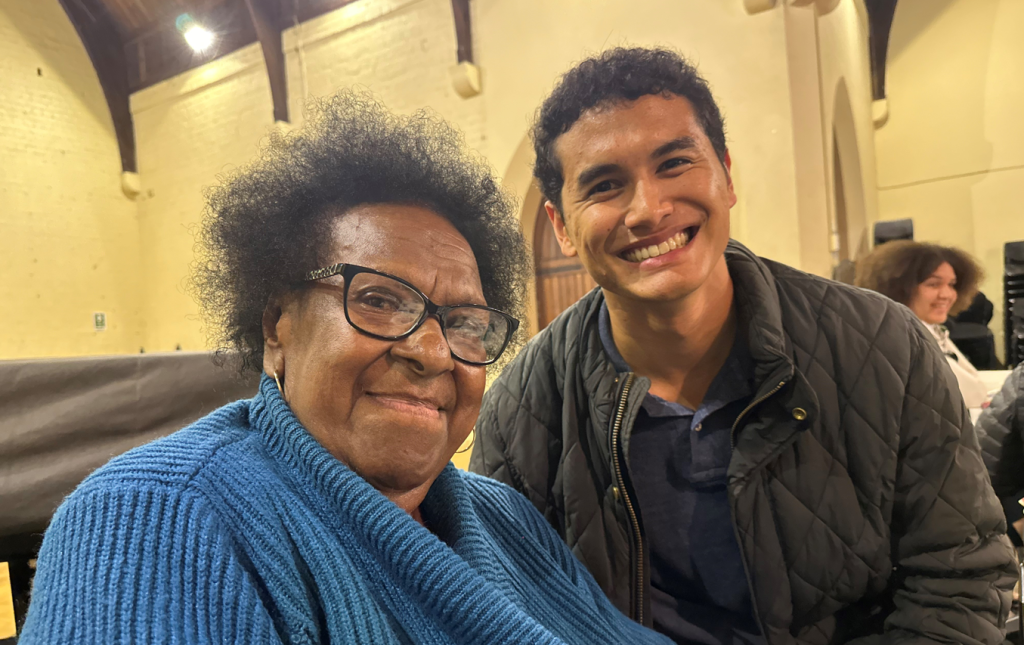
Saibai elder Aunty Dr Rose Elu loves spending time with young people — she is pictured here with Erub man Aiden Wu (from St John’s College within the University of Queensland) celebrating The Coming of the Light at Holy Trinity Anglican Church in Fortitude Valley on 1 July 2024
What do your roles involve?
My current roles are National Aboriginal and Torres Strait Islander Anglican Council (NATSIAC) executive member; Anglican Church of Australia Standing Committee member; Torres Strait Islander Anglican Parish Synod representative; Anglican Church Southern Queensland Reconciliation Action Plan Working Group member; and, Anglican Indigenous Network member. The Anglican Indigenous Network is an Anglican Communion network. I advocate for First Nations peoples in these roles, fostering Reconciliation and campaigning and lobbying for stronger action to heal the climate.
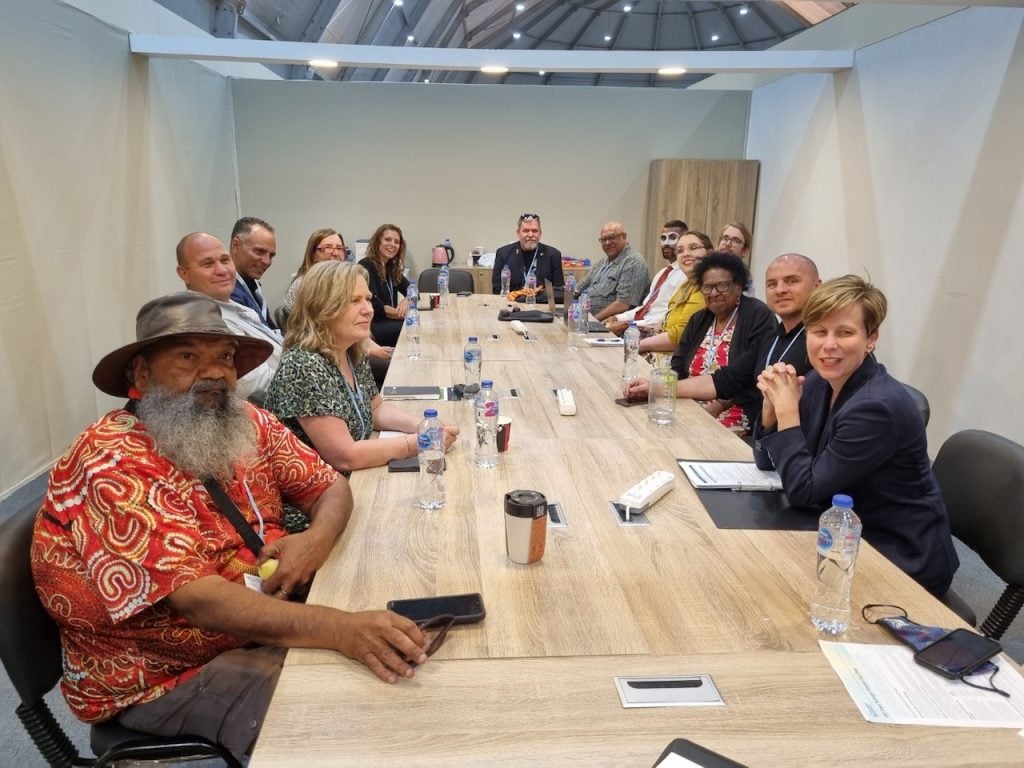
“I spoke at a roundtable discussion with other Aboriginal and Torres Strait Islander delegates and the Assistant Minister for Climate Change and Energy, Senator the Hon Jenny McAllister” (Aunty Dr Rose Elu, COP27)
What has been one of the highlights of your time in your current role?
There have been many highlights, mostly to do with extraordinary people I have met. I spoke about climate change at the World Council of Churches gathering at Porto Alegre in Brazil in 2006. I met the Archbishop of Canterbury, Rowan Williams, in a marquee there.
Another highlight is when Queen Elizabeth visited Brisbane 1988 — she was introduced to elders outside St John’s Cathedral.
While I was studying my PhD in customary law at the University of Hawai’i in the early 1990s, I became friends with a woman who volunteered at the St Andrew’s Cathedral book shop in downtown Honolulu. She was the beloved grandmother of Barack Obama. When I met Barack Obama in New York in 2014 at a gathering while he was president, I told him that I had been good friends with his late grandmother. He wrapped me in a big bearhug and told me that he was very close to her growing up.
I have been to many installations and consecrations over the years; however, greeting Archbishop-elect Jeremy in Language as he entered the Cathedral last year was the most significant for me. Archbishop Jeremy is very pastoral, devoted to First Nations peoples and energetic, and he is an intellectual thinker.
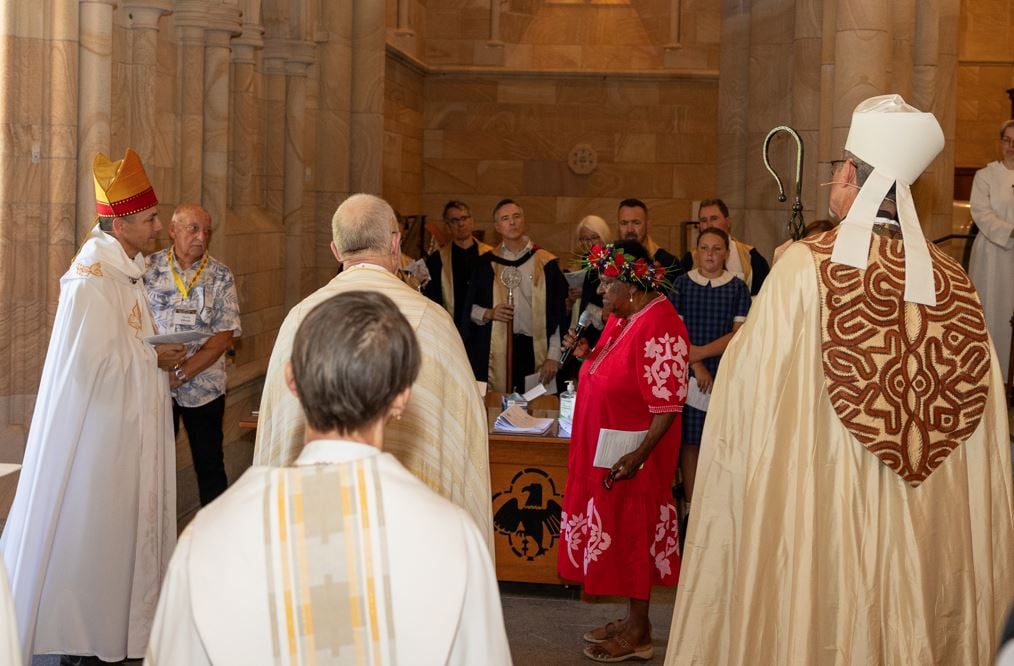
Aunty Dr Rose Elu, who is from the Saibai chieftain clan, said that she was proud to accompany Archbishop-elect Jeremy Greaves from the Cathedral entrance to the sanctuary during his Installation service on 16 December 2023
What projects or activities are you currently working on?
I am part of a seminal class action, led by Uncles Pabai Pabai and Paul Kabai, arguing that the Commonwealth owes a duty of care to Torres Strait Islander peoples to take reasonable steps to protect us from climate harm. I assisted the legal team who argued that the court should order the Commonwealth to reduce greenhouse gas emissions to specific levels by 2030 and 2050. The final hearings and closing arguments for the landmark case were held in Cairns in May. We expect to find out the outcome next year.
I am going to the UN Conference of the Parties COP29 meeting in Baku (Azerbaijan) in November to speak about climate harm again. I will be speaking as a member of the Anglican Indigenous Network through my NATSIAC connection. I last spoke at COP in Egypt two years ago. COP is the decision-making body that oversees the UN’s Framework Convention on Climate Change (UNFCCC).
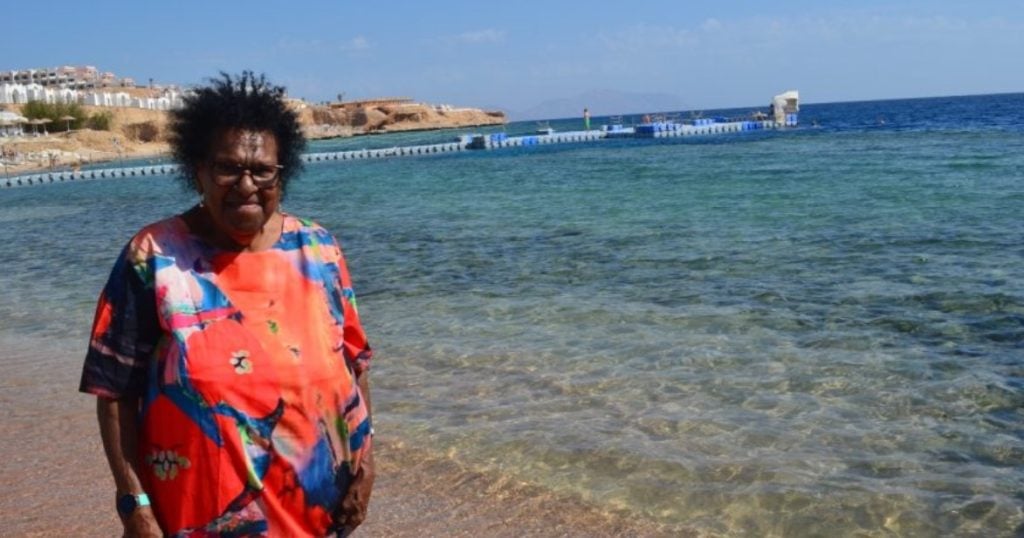
Aunty Dr Rose Elu spoke at COP27 in Egypt in November 2022 as a representative of the Anglican Indigenous Network, which nominated her to join other Anglican Communion delegates at the United Nations Climate Change Conference (she is pictured walking by the Red Sea)
Can you tell us a little about your faith journey?
My Christian faith is intertwined with my island spirituality. I relate to God’s creation through my Saibai (island) home and through my second home at Seisia on the Cape. I have a Saibai family and a Seisia family. It’s important for non-Indigenous people to understand that the spiritualities of First Nations peoples are ancient. Indigenous Christian people like myself seamlessly blend our ancient spirituality with our Christian faith. We especially know how to care for God’s creation because our ancient spiritualities are about balance.
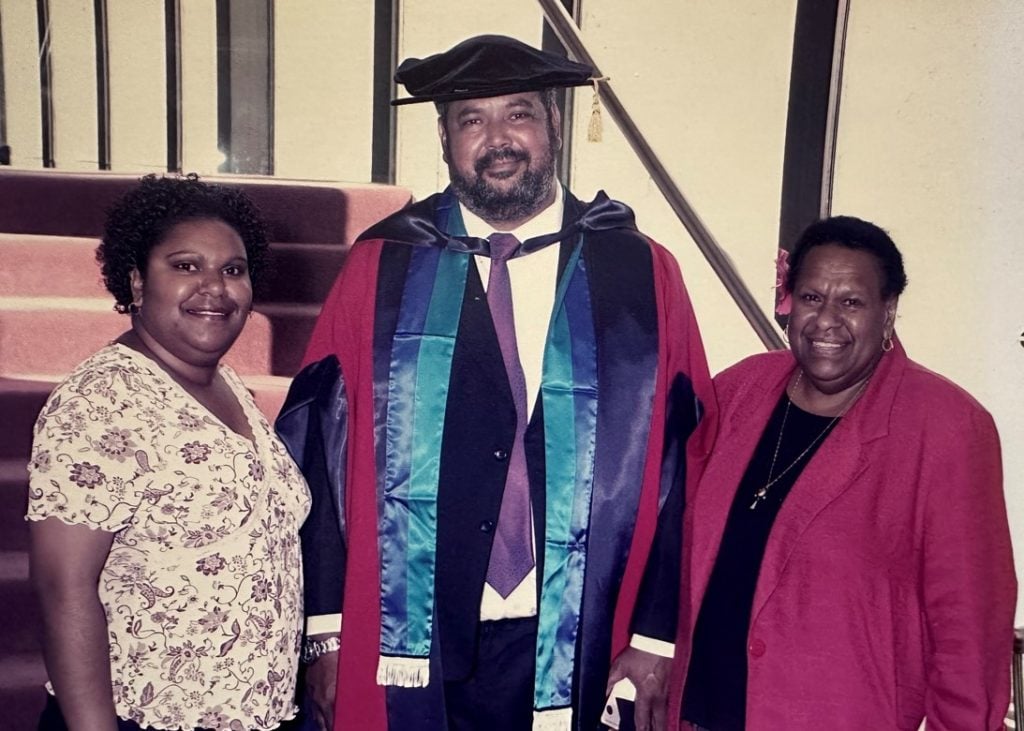
Aunty Dr Rose Elu (right) with her daughter Davina and her brother, Dr Joseph Elu, in the 1990s when Dr Joseph was conferred his decorate. Dr Joseph Elu is the chief of the crocodile clan on Saibai
How does your faith inspire you and shape your outlook, life choices and character?
I embrace my faith every day in everything I do. I get up at early every morning to meditate. My faith really gives me strength and energises me. It gives me wisdom and comforts me at times of grief.
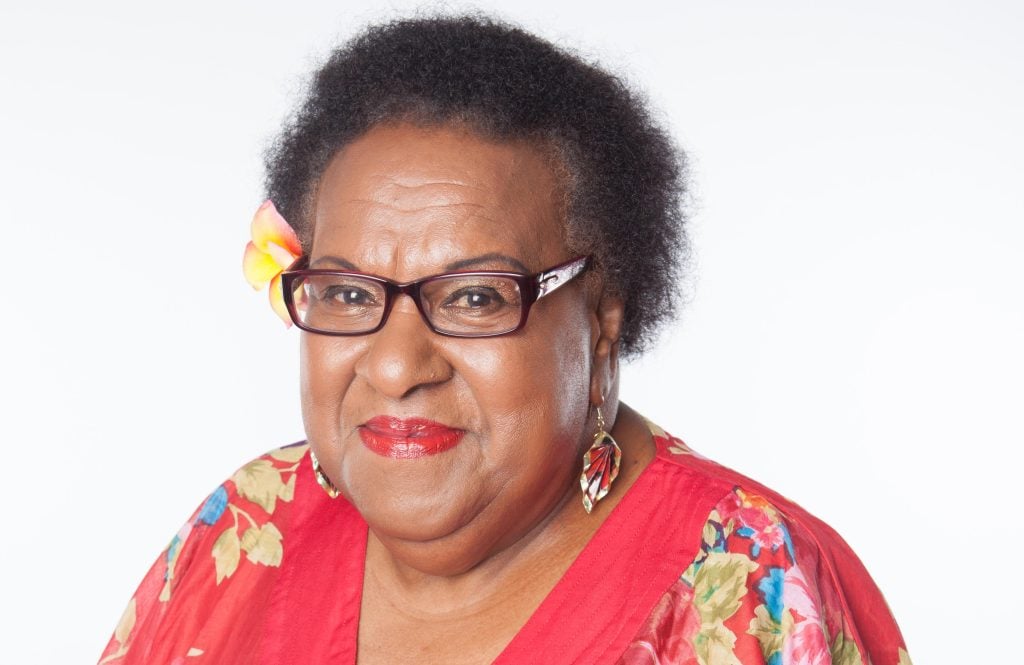
“My faith really gives me strength and energises me,” Aunty Dr Rose Elu
What are the primary strengths of the Church and what is the best way to make the most of these for the benefit of our communities?
Singing and praying in Language, in Kalaw Kawaw Ya, are important to me. I like interpreting my prayers into English for people after I have said them in Kalaw Kawaw Ya. It’s important for elders like me to welcome non-Indigenous people into the Torres Strait Islander space. So, a strength of the Church is how it builds community through fellowship and relationships.
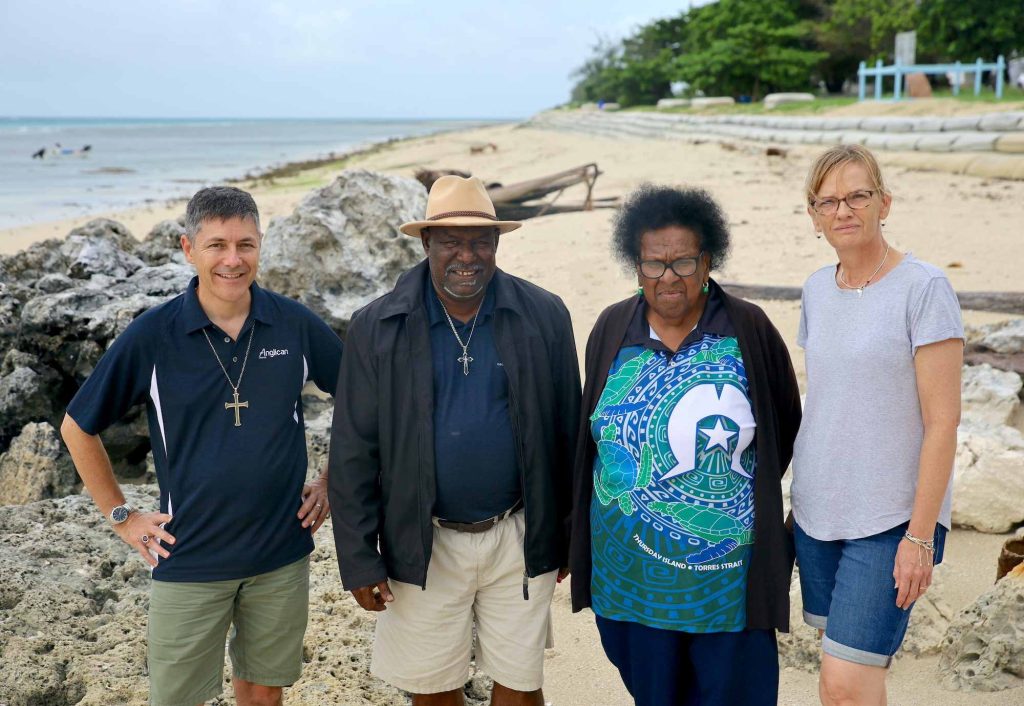
Archbishop Jeremy Greaves, Cr Francis Pearson, Aunty Dr Rose Elu and Josie Greaves on Poruma on Thursday 9 May 2024
What is your favourite Bible scripture and why?
“Do not let your hearts be troubled” (John 14.1). This is my favourite scripture because in my work as a relationships counsellor and community engagement officer and in my social justice work, I meet many people who are burdened. This scripture reminds me that God is there for all of them.
What person of faith inspires you the most and why?
My uncle, who was the first Torres Strait Islander Bishop, (the late) The Right Rev’d Kiwami Dai. He was a very spiritual person. He was well known in the Brisbane Diocese. He told us Torres Strait Islander parishioners to stay at Holy Trinity, Fortitude Valley.
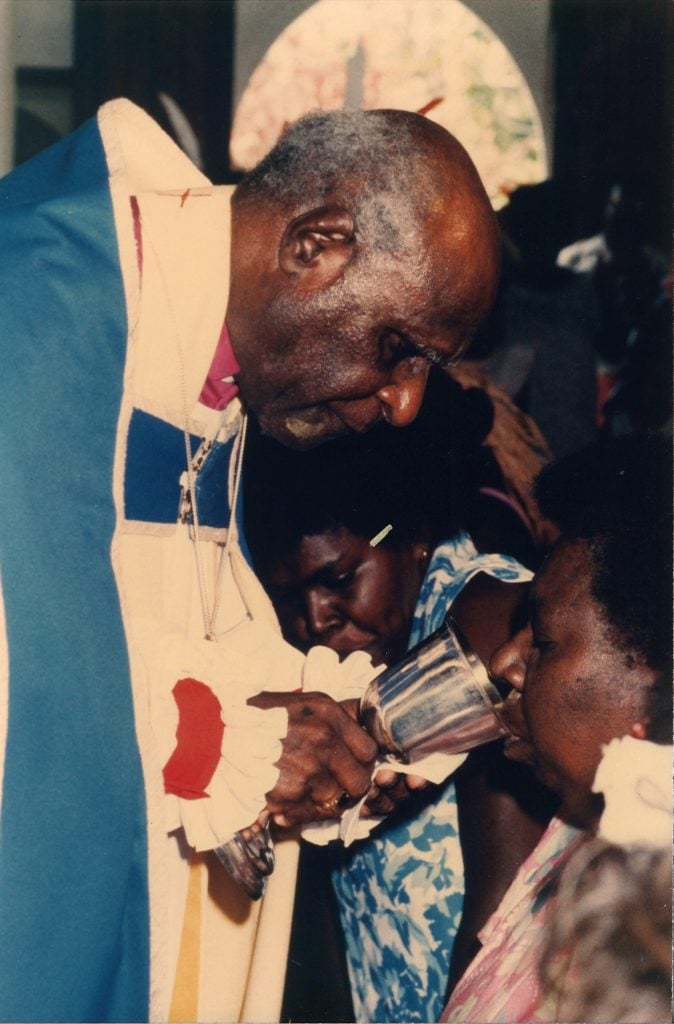
Aunty Dr Rose’s uncle, (the late) The Right Rev’d Kiwami Dai, was consecrated the first Torres Strait Islander bishop in July 1986 at All Souls’ and St Bartholomew’s (Quetta Memorial) Anglican Church on Waiben (Thursday Island)
Why is it important for Christians to work with Aboriginal and Torres Strait Islander peoples towards Reconciliation?
A lot of harm has been done by Churches. Many Churches were culpable in the stealing of children and the human rights abuses that happened on “missions”. The Queensland Government is holding a Truth-telling and Hearing Inquiry and the Inquiry’s terms of reference include “faith-based organisations”. It’s important that the Church participates meaningfully in the Inquiry.
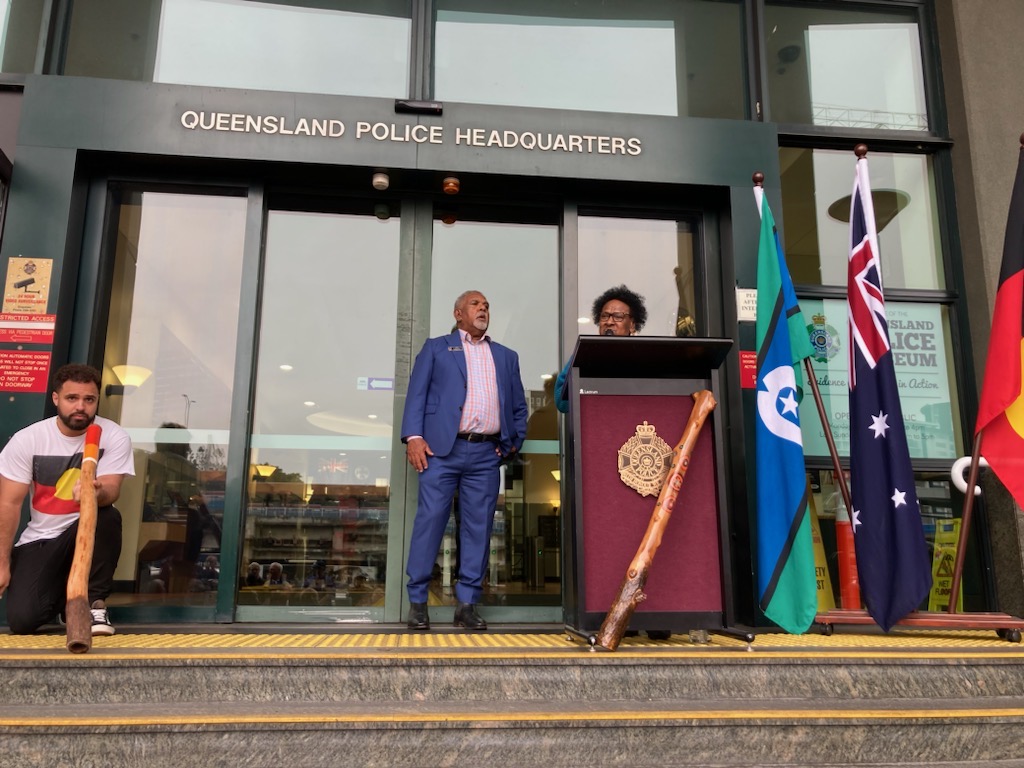
On 4 July 2023 during NAIDOC Week, at an Elders event, Aunty Dr Rose Elu acknowledged Country on behalf of Torres Strait Islander peoples, raised the Torres Strait Islands flag and prayed a blessing over the food outside the Roma Street police station
Whom did you last light a candle for?
Today I lit a candle at church for the Palestinians of Gaza, especially the older people and the children. There is no reason for them to die. It’s absolute murder for innocent lives to be taken. The Australian Government should do more — by speaking up more strongly and committing to a two-way military trade embargo. All Christians need to speak up and pray hard for a just peace. I think we should have a day of prayer internationally dedicated to praying for a ceasefire — for the bombing to stop.
What is the kindest gesture you have ever received or witnessed?
There have many. It meant a lot when Archbishop Jeremy came with me to the Torres Strait in May, along with his wife Josie and Peter from the Justice Unit, to witness the impacts of the damaged climate on low-lying islands. We were all shocked by the level of shoreline erosion that we witnessed. Archbishop Jeremy took the time to speak with local leaders and elders so he could understand the impacts of climate harm on our livelihoods, cultures, homes, fresh water supply, traditional food gardens and ceremonies.
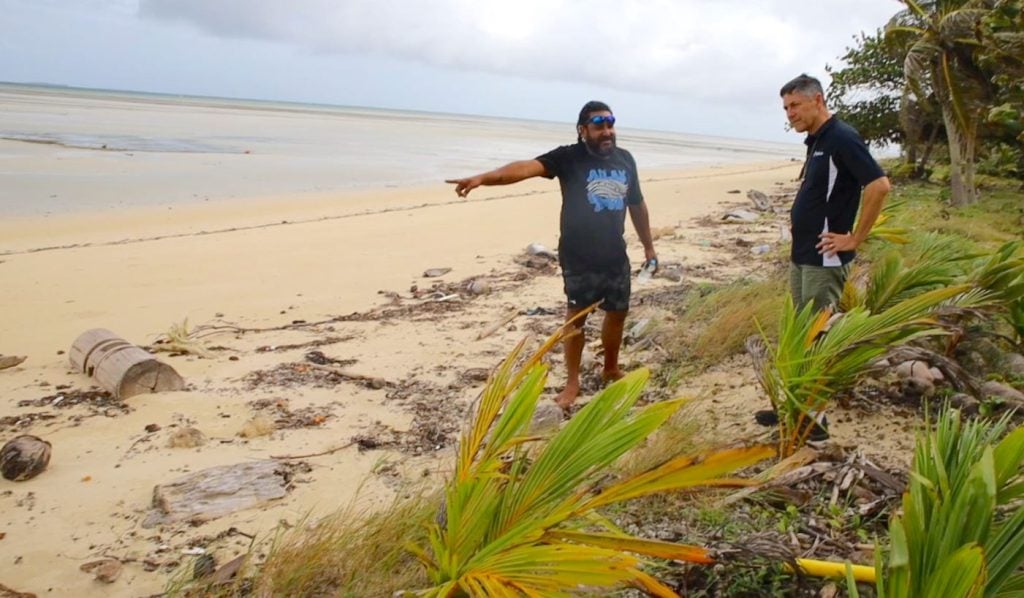
“Torres Strait Eight” Traditional Owner Yessie Mosby showing Archbishop Jeremy Greaves the impacts of climate change, including the shrinking shoreline and where the ancestral resting places were previously located before being washed away, at his family’s property on Masig on Saturday 11 May 2024
What is the best piece of advice you have ever received and who gave you this advice?
“Always be who you are — don’t be someone you are not.” My father, who was a chief, taught me that.
What do you do in your free time to recharge and relax?
I read books and pray. I pray a lot.
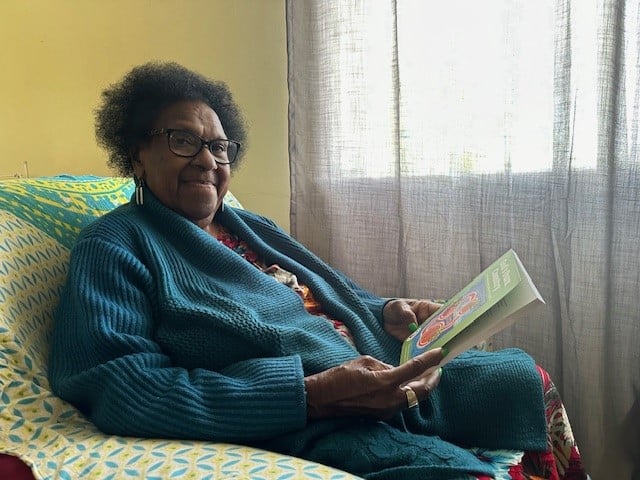
Aunty Dr Rose Elu is an avid reader and prayer — she is reading the 2024 ABM Lenten devotional, God’s Own Country: First Nations voices speak to the Church, which she contributed to
If you found yourself on a deserted island, what three things would you choose to have with you?
A piece of rock to make a fire, along with coconut husk for kindling, and a conch shell to send a message every day.
Where do you do your best thinking?
Near the ocean.
What’s your best childhood memory?
Waterskiing with my family at the Lakes Entrance in Victoria.
What is your earliest memory?
When I was about six or seven, my father and uncles set sail in a small dinghy from Seisia to Waiben (Thursday Island). We were not far from Seisia on the Cape when our boat capsized. Because I couldn’t swim, my father and uncles passed me from one to another to get me safely to shore. They then carried me to the village in Seisia where my adopted Aboriginal grandma and grandpa rubbed me with goanna oil to strengthen my exhausted limbs.
If you are having a bad day, what do you do to cheer yourself up?
Lots of coffee and window shopping.
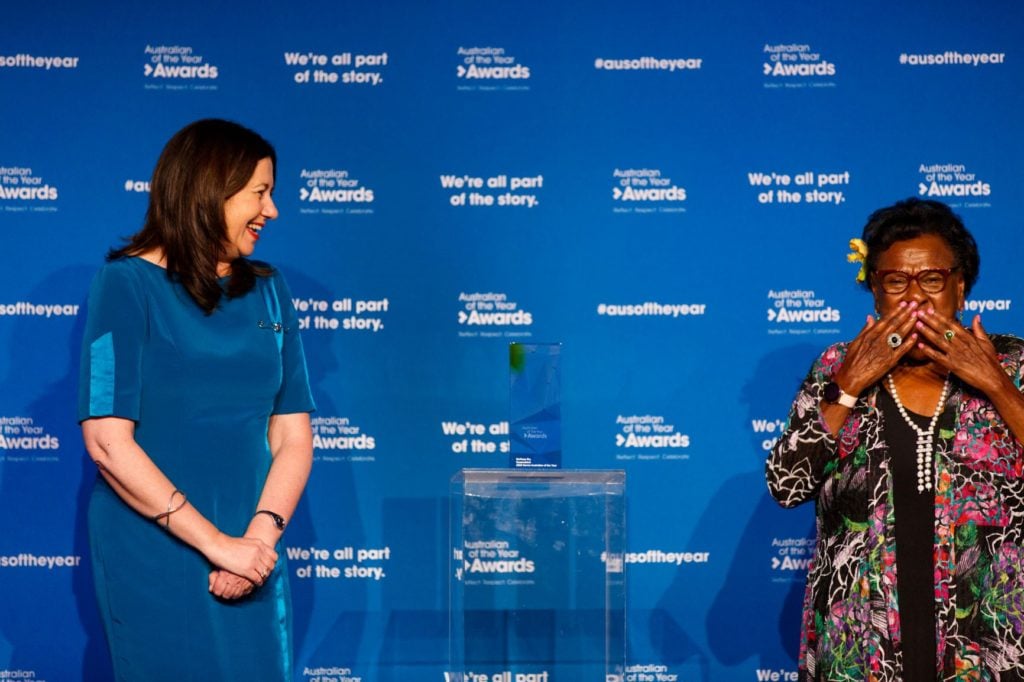
Aunty Rose charmed Premier Annastacia Palaszczuk and all others in attendance with her warmth at the 2021 Queensland Australian of the Year Awards, which were held on Tuesday 10 November 2020. Aunty Rose was awarded 2021 Queensland Senior Australian of the Year for helping negotiate the legal recognition of the traditional customary adoption practices of Torres Strait Islander families in Queensland and for championing renewable energy and sustainable methods of production
What is your secret skill?
Meditation. I also speak nine languages and dialects.
What day would you like to re-live and why?
There are so many. One is when I travelled overseas to Europe in 2022 for the Lambeth Conference. I would like to re-live seeing Canterbury Cathedral for the first time.
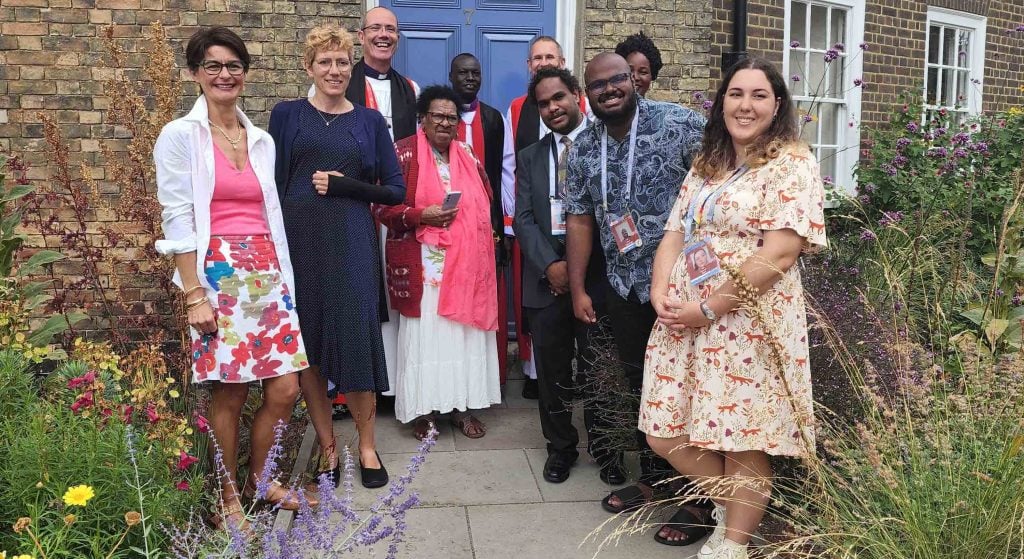
Kate Venables, Frances Thompson, Bishop Cam Venables, Bishop Daniel Abot, Aunty Dr Rose Elu, Bishop John Roundhill, Rachel Jimma, and stewards Lindsay Murgha (from Cairns), Aaron Vidya Sagar and Eleanor Reid gathered in front of a Canterbury Cathedral apartment at the 2022 Lambeth Conference
If you could only eat one thing for the rest of your life, what would that be?
Seafood, especially barramundi, crayfish, prawns and oysters caught off Seisia on the Cape.
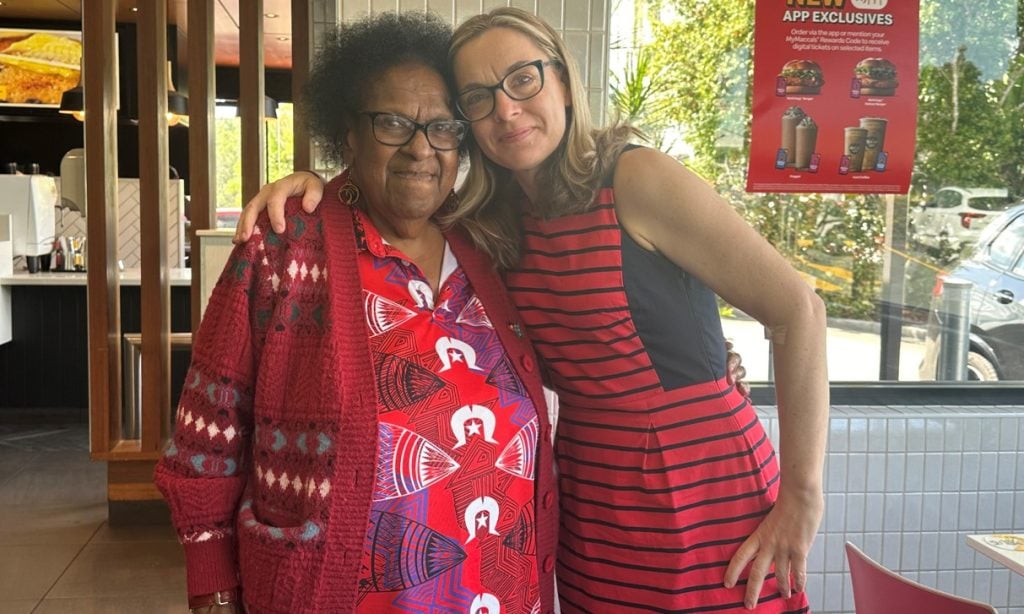
A big thanks to Aunty Rose for meeting with the anglican focus editor to share her responses in this Q&A interview (September 2024)
Editor’s note: Thank you to Aunty Dr Rose Elu for always giving so generously of her time and knowledge to anglican focus.

